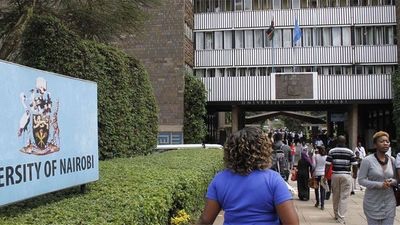Freshmen joining the University of Nairobi (UoN) for postgraduate and self-sponsored degree courses from next month have been slapped with sharply increased fees despite the recent public pressure on the institution to reverse the decision.
The university’s deputy vice-chancellor in charge of academic affairs, Julius Ogengó, said the institution’s newly revised fees structure would be implemented with effect from September when the 2021/2022 academic year commences.
“The revised schedule of academic fees shall apply only to self-sponsored first-year undergraduate and postgraduate students who report from September 20, 2021,” he said in a circular to students dated August 24, 2021.
“(The) revised administrative and academic fees shall not apply to continuing students in 2nd, 3rd, 4th, 5th, and 6th year were first registered will subsist.”
The university administration caused an uproar last month after it more than doubled fees for postgraduate courses and parallel degrees to ease a cash crunch brought home by a dip in student enrolment.
The university raised fees for students pursuing Master’s degrees in courses like communication and business administration (MBA) to Sh680,000 for a two-year programme from an average of Sh275,000, reflecting an increase of 147 percent.
The fees for degree courses in commerce, economics, and law under the parallel degree programme have been increased by up to 70 percent to about Sh1 million for the four years.
Undergraduate government-sponsored students for the medical course who will join in September will now pay Sh59,000, up from Sh26,500, indicating a 123 percent increase. They will pay Sh54,000 in their second year.
Self-sponsored students for the undergraduate medical course will pay Sh640,000, up from Sh445,000.
Tuition fees for self-sponsored students pursuing Master’s degree in medicine ear, nose, and throat surgery have increased to Sh648,000 per academic year or Sh324,000 per semester.
They will part with Sh3.43 million over the five years on the programme inclusive of administrative charges.
The university is betting the review will lift revenues from fees, which have dropped in recent years and pushed Kenya’s leading public university to a Sh1.4 billion loss in the year to June 2018.
This follows declined student enrolment for most courses coupled with competition from other intuitions and technical and vocational education and training institutions (TVETs).
Data shows undergraduate students at UoN dropped to 52,990 in the 2019/2020 academic year, down from 58,281 in the previous year.
In 2019/2020, UoN registered 9,973 students for PhD and Master’s courses from 12,234 students in 2018/2019, representing an 18.5 percent drop.
UoN has also abolished some offices, merged functions, and created new posts in a move to eliminate duplication and cut costs.
The university has scrapped eight colleges and collapsed faculty functions from 35 to 11. All positions of principals and their deputies have been terminated and roles reorganised under new positions of executive and associate deans.
Universities have been in financial trouble due to a sharp drop in the number of students sponsored by the government and those in the self-sponsored modules.
Both public and private universities introduced similar courses to gain a share of government funds after the introduction of centralised placement system in 2016, allowing admission of government-sponsored students to private universities.
This has led to a lower number of students enrolling in courses in an institution and State’s capitation.
Students are also now choosing to join TVETs, which charge lower rates and offer in-demand technical courses.
Data from the Kenya Universities and Colleges Central Placement Service (KUCCPS) shows that the 69 public and private universities admitted 128,073 students against available space for 167,046.
This means that 76.6 percent of available capacity in universities has been filled for this year, a drop from 84.6 percent in 2020 when the institutions were left with 22,298 unfilled places.
The number of students who scored the C+ minimum entry grade and above in the Kenya Certificate of Secondary Education (KCSE) exam that opted to join TVETs increased 40 percent, an indication that technical courses are gaining popularity.
In the 2020 KCSE, 6,617 students who scored C+ and above chose TVET programmes and were placed, up from 2,632 in 2019.
There's no story that cannot be told. We cover the stories that others don't want to be told, we bring you all the news you need. If you have tips, exposes or any story you need to be told bluntly and all queries write to us [email protected] also find us on Telegram

